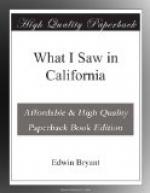“At daylight we started, with a flag flying and a drum beating, and travelled eight or ten miles, when we camped in a low valley or hollow. There they caught with the lasso three or four head of cattle belonging to the nearest rancho, and breakfasted. The whole day their outriders rode in every direction, on the look-out, to see if the American company left the mission of San Juan, or Lieutenant-Colonel Fremont left Monterey; they also rode to all the neighbouring ranches, and forced the rancheros to join them. At one o’clock, they began their march with one hundred and thirty men (and two or three hundred extra horses); they marched in four single files, occupying four positions, myself under charge of an officer and five or six men in the centre. Their plan of operation for the night was, to rush into San Juan ten or fifteen men, who were to retreat, under the expectation that the Americans would follow them, in which case the whole party outside was to cut them off. I was to be retained in the centre of the party. Ten miles south of the mission, they encountered eight or ten Americans, a part of whom retreated into a low ground covered with oaks, the others returned to the house of Senor Gomez, to alarm their companions. For over one hour the hundred and thirty Californians surrounded the six or eight Americans, occasionally giving and receiving shots. During this period, I was several times requested, then commanded, to go among the oaks and bring out my countrymen, and offer them their lives on giving up their rifles and persons. I at last offered to go and call them out, on condition that they should return to San Juan or go to Monterey, with their arms; this being refused, I told the commandante to go in and bring them out himself. While they were consulting how this could be done, fifty Americans came down on them, which caused an action of about twenty or thirty minutes. Thirty or forty of the natives leaving the field at the first fire, they remained drawn off by fives and tens until the Americans had the field to themselves. Both parties remained within a mile of each other until dark. Our countrymen lost Captain Burroughs of St. Louis, Missouri, Captain Foster, and two others, with two or three wounded. The Californians lost two of their countrymen, and Jose Garcia, of Val., Chili, with seven wounded.”
The following additional particulars I extract from the “Californian” newspaper of November 21, 1846, published at Monterey: “Burroughs and Foster were killed at the first onset. The Americans fired, and then charged on the enemy with their empty rifles, and ran them off. However, they still kept rallying, and firing now and then a musket at the Americans until about eleven o’clock at night, when one of the Walla-Walla Indians offered his services to come into Monterey and give Colonel Fremont notice of what was passing. Soon after he started he was pursued by a party of the enemy. The foremost in pursuit drove a lance at the Indian,




